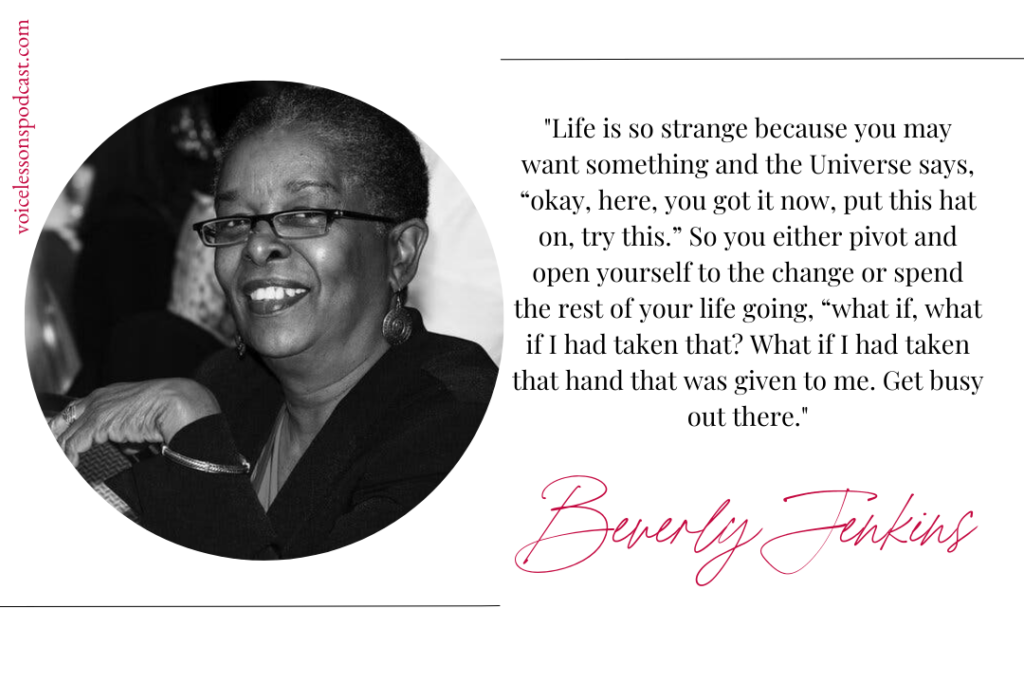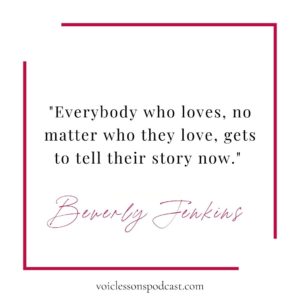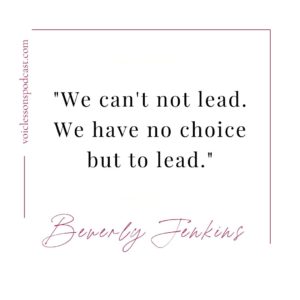https://directory.libsyn.com/episode/index/id/19528970
Beverly Jenkins never planned to be an Author. Growing up during the Civil Rights Movement, her mother passed along a love of books and history and she decided to become a librarian. In this episode, she talks about the journey from first-time author to becoming the primer writer of historical Black fiction in the United States with 49 books in an industry that rejected her. Beverly also shares intimate moments of her past, her process, and why she’s rooting for women writers to get off the sidelines and just “publish your damn book”.
 Beverly Jenkins is the recipient of the 2017 Romance Writers of America Nora Roberts Lifetime Achievement Award, as well as the 2016 Romantic Times Reviewers’ Choice Award for historical romance. She has been nominated for the NAACP Image Award in Literature, was featured both in the documentary “Love Between the Covers” and on CBS Sunday Morning. Since the publication of Night Song in 1994, she has been leading the charge for multicultural romance and has been a constant darling of reviewers, fans, and her peers alike, garnering accolades for her work from the likes of The Wall Street Journal, People Magazine, and NPR.
Beverly Jenkins is the recipient of the 2017 Romance Writers of America Nora Roberts Lifetime Achievement Award, as well as the 2016 Romantic Times Reviewers’ Choice Award for historical romance. She has been nominated for the NAACP Image Award in Literature, was featured both in the documentary “Love Between the Covers” and on CBS Sunday Morning. Since the publication of Night Song in 1994, she has been leading the charge for multicultural romance and has been a constant darling of reviewers, fans, and her peers alike, garnering accolades for her work from the likes of The Wall Street Journal, People Magazine, and NPR.LISTEN: APPLE PODCASTS | STITCHER | SPOTIFY
TOPICS DISCUSSED IN THIS EPISODE:
- Beverly didn’t plan on being an author.
- Beverly’s mother passed along her love of history and reading to her at a very young age.
- Black history was very important to Beverly’s great grandfather on her Mother’s side which can now be seen in her books.
- During Beverly’s childhood, libraries were still segregated. African American authors were never shelved in with the rest of the collection.
- When Beverly first started writing, Black characters were not prevalent in romance or history stories. There was also no place to get published as a Black author in these genres until the 1990s.
- Plotters vs. Pantsers
- Beverly’s writing process
- The point that Beverly knew she could write.
- How and why she started her first book.
- Beverly has written 49 books in her lifetime, typically in the Historical Romance genre.
- What is a sweet romance?
- How Beverly handled the rejections she faced in the publishing industry.
- How Beverly found her editor.
- How the portrayal of strong and determined Black women has changed in the model in the romance genre.
- Black women’s three gifts and how Beverly highlights these in her heroines.
- Beverly’s newest book Wild Rain and why her character came to be.
- Beverly’s new Women Who Dare series.
- How Beverly views feminine leadership.
- If you have the writing bug, it’s not going anywhere. It’s up to you to decide that you’re strong enough and brave enough to pursue your dream.
RESOURCES/ADDITIONAL INFORMATION:
The Creation Poem- James Weldon Johnson
The Flame and the Flower, Kathleen Woodiwiss
Elsie B. Washington; wrote the first Black romance novel.
We Are Your Sisters, Dorothy Sterling
Bullwhip Days, James Mellon
Slayer of Words: Beverly Jenkins wins Nora Roberts Lifetime Achievement Award
#LESSONUP:
(3:15-3:54) So it’d be my great-grandfather was what they called back then a race man. He was also Muslim. He had converted, he went to Mecca and he went to Medina and lived in Pakistan for a while and lived in Nepal. And that Black history was very, very important to him. And he gave that love to her. She’s the second oldest of seven. So anytime there was anything on TV, I was young in the fifties during the civil rights movement. I mean the stuff was always on TV and she would always say, be proud of who you are. And there’s nothing that anybody can take from you as long as you’re educated, as long as you’re reading. So that history is a part of me.
(5:40-6:15) I may start out with just a kernel of a story or a kernel of a character. And we parents just, just start throwing stuff up against the wall to see what sticks I often say. I feel like the first two weeks, when I’m working on a new book, I’m like Moses wandering around in the desert with the Israelites, looking for the promised land. And then it starts to slowly unfold. I always think the characters know the story and I don’t.
(13:17- 13:40) The letters that are at the beginning didn’t come to me until about a third of the way through the book. And it was almost as if the man who pins the letter to his sisters, wanted me to let them know what happened to him. It was one of the eeriest experiences I’ve ever had. I had one of my readers said, well, you know Ms. Bev, these people actually existed. They’re just using you to tell their stories.
(15:20-16:02) In college I was Black. I went to college in the seventies, so I was Black then. I just get up every morning and say, what are we being called today? And in my mother’s day was Negro. And I took the powers that be 40 years to capitalize the N and they wrote it doesn’t matter what you call me. Just don’t use the N word by me by my name and know that I am who I am by the color of my skin. ]Try not to get hung up on that.
(16:10-16:58) I’m trying and that’s your job is to try and make the path wider. The change is it’s who gets to write romance now. There are so many African-American women and women of color who are getting to tell their stories and women from the west indies and women from Africa and, and, you know, in black women of America and every one of you know, all identities, we’ve got a lot of male male stories. We’ve got a lot of lesbian stories. The model that was in place when I started a couple of it was male, female straight, and white is no longer the model. Everybody who loves and no matter who they love gets to tell their story now. And I, and I think that that’s probably one of the best things to ever come about for the romance genre.
(17:05-18:30) Black women have always written that story and the, and the white heroin has changed, but we never had the luxury of just sitting back. And that was one of the things that I learned from Dorothy Sterling. She said Black women were pretty successful after the civil war. And she said because we have these three gifts. One was that we worked, whether we were slaves, whether we were enslaved, or whether we were free, because if you were free and on your own, you had to provide. And if you were free and you were married, you also had to provide because our men were usually relegated to very, very low-paying menial jobs. So you needed that extra income. So we worked, the second gift was the commitment to community and social activism. We had lots of black women out there, marching and chasing down, chasing down slave catchers in the, in the communities, leading the charge. And the third gift was pushing the envelope on gender and race and they still are today. And we’re still doing that. So I try when I put my heroines together, a lot of times when they present themselves to me, because my characters present themselves to me, they’ll have one or two or all three of those gifts. So I wouldn’t be true to the history of that. Unless a woman is one of the elite, but still she’s got to deal with the societal issues and all of that. But I know we’re not sitting back eating Bonbons all day.
(23:10-24:20) When I started out, we didn’t have self-publishing. Once you were rejected, you either kept trying, or you went to a different publisher, but get that book out of the drawer and get busy. There is a market of readers who are waiting for your story. There is always somebody out there looking for a story that you’re going to write, finish it, stop talking about it, finish it. Learn as as much as you can about the business of variety. And there’s a great community of writers out there who will give you the help that you need, especially with romance. I mean, we’re always helping each other. Learn how to upload, learn where to find a cover artist and learn how to do a blurb, learn how to do the marketing that goes with self-publishing. I wasn’t published until I was in my forties. So don’t let that deter you.
(25:50-26:25) My very first writing space was the front hall closet. So don’t tell me that you don’t have a place to ride, or you don’t have time. I have sat at band practice in the middle of the dark, under the lights at the stadium, editing, sitting in band concerts, editing until the lights went out. If you have that writing bug within you, it’s not going anywhere. It’s going to sit on you and sit on your shoulder and whisper in your ear until you decide “I’m strong enough and I’m brave enough to do this.”
PIN IT:


Comments +